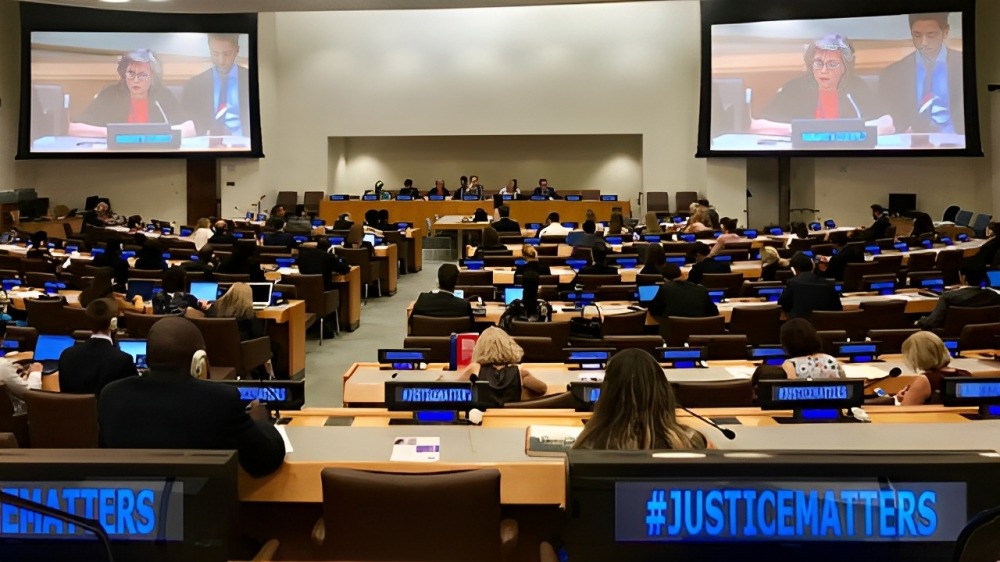
The Hague/ New York
International Justice Day is commemorated on 17 July, marking the 21st anniversary of the adoption of the Rome Statute of the International Criminal Court (ICC), which established the first treaty-based permanent international court to bring justice to victims of the gravest crimes of concern to the international community: genocide, crimes against humanity, war crimes, and the crime of aggression.
Accountability is as a prerequisite for peace, stability and sustainable development based on the effective protection of human rights. Today, PGA President Margareta Cederfelt, MP (Sweden), emphasized this message as she joined the President of the International Criminal Court, Judge Chile Eboe-Osuji, to address before the United Nations in New York: “there is no lasting peace without justice and no justice as long as there is impunity.”
The exercise of domestic jurisdiction complemented by the ICC as Court of last resort are essential tools to end cycles of impunity, violence, and atrocity. However, despite having been a reality for more than two decades, the Court now faces arguably some of the greatest existential threats in its history. Those who would preserve impunity for the gravest international crimes that shock the conscience of humanity perpetuate misinformation and seek to evade the Court’s jurisdiction, while new efforts are underway to address internal shortcomings and deficiencies within the Court itself and its Assembly of States Parties.
Now, more than ever, the ICC and the project of international criminal justice that it represents need champions. The parliamentarians who comprise PGA’s international network are at the forefront of the fight to ensure that the combined forces of domestic and international justice prevail, that victims’ inalienable rights are respected in every corner of the globe, and that all law-abiding nations join the Rome Statute system. They recognize that, in the defining words of Dr. Martin Luther King, Jr., “injustice anywhere is a threat to justice anywhere.”
True to its name, PGA’s members remain steadfast, taking concrete action to support the universality of the Rome Statute and the effective functioning of a jurisdictional system that can truly combat impunity and ensure accountability for international crimes. This includes calling for the arrest and surrender of former Sudanese President Omar al-Bashir, appealing for investigation and prosecution of alleged atrocity crimes in the Democratic Republic of the Congo, and combatting efforts to undermine the Rome Statute, including those made by the U.S. administration.
Since the last International Justice Day, PGA members in Latin America have demonstrated their commitment through concrete action by ratifying the Kampala Amendments on the Crime of Aggression (Paraguay and Ecuador) and adopting legislation on cooperation with the Court (Costa Rica and the Dominican Republic). Nearly 100 parliamentarians in more than 30 countries in Latin America, as well as in the Pacific Islands and Africa committed to Plans of Action toward ratification and domestic implementation of the Rome Statute, and cooperation with the ICC. A similar number of Lawmakers from all regions of the world met in the Verkhovna Rada (Parliament) of Ukraine in November 2018 to support global justice and, in particular, the ratification by Ukraine.
Embodying the spirit of action that animates PGA on this International Justice Day, leading member Mr. Helmut Scholz (Member of European Parliament, Germany) is planning to introduce a motion for a resolution in the European Parliament to appeal for support for the ICC to exercise its jurisdiction over atrocities inflicted against migrants and asylum seekers via airstrikes on a detention center in Libya to bring justice to the most vulnerable.
International Justice Day provides an opportunity not for celebration, but rededication to the pursuit of international justice. On this day, PGA’s members unite to put an end to crimes that threaten global peace, commit to utilizing their full legislative and political prerogatives in the fight against impunity, and call upon others to join them.



